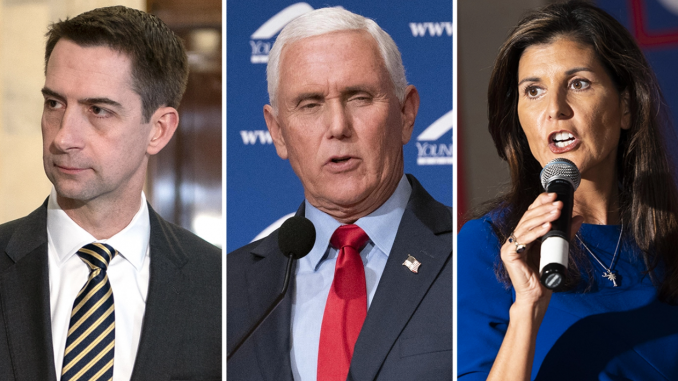
The 2024 GOP shadow primary is shaping up to be one for the books.
It has become a rite of passage for would-be presidential candidates to release a memoir or new book in the run-up to their campaign, and the crop of potential Republican contenders for 2024 is no exception as several individuals viewed as likely candidates are releasing publications in the coming weeks.
Sen. Tom Cotton (R-Ark.) will have a book on restoring American power released on Nov. 1.
Former Vice President Mike Pence on Nov. 15 will release his memoir detailing his political career and falling out with former President Trump in the wake of the Jan. 6, 2021, attack on the Capitol.
Former Secretary of State Mike Pompeo will detail his foreign policy work in a forthcoming book due out Jan. 24, 2023.
Nikki Haley, the former U.S. ambassador to the United Nations and South Carolina governor, released a book on Oct. 4 on leadership lessons from influential women. Sen. Tim Scott (R-S.C.) released a memoir in August.
Haley, Pence, Cotton and Pompeo are all viewed as laying the groundwork for presidential runs with frequent visits to early primary states, while Scott is seen as a potential under the radar candidate in 2024.
“A book tour provides excellent cover for exploring the feasibility of a presidential campaign,” said Michael Cornfield, an associate professor of political management at George Washington University.
“You have an excuse to tour the country, especially early primary states and big fundraising hubs; your name gets out there as a thoughtful, visionary, and experienced politician via advertising, press interviews, and book reviews, although those can be harsh, and all the while you don’t have to register and report contributions and expenditures to the FEC,” Cornfield said.
For those considering launching a presidential bid, a book release offers the opportunity to accumulate two key commodities: media attention and money.
Book releases are typically accompanied by media tours to promote the publication, giving would-be candidates an opportunity to get on major morning shows, travel the country and meet with prospective voters.
Pompeo, for example, went on Fox News’ “Fox & Friends” to announce the upcoming release of his book, giving him another opportunity to connect with the audience of the popular conservative morning show.
The other benefit is book sales can be an income boost ahead of a presidential run, when being a candidate becomes a full-time job.
Alex Conant, who worked on campaigns in 2012 and 2016 for former Minnesota Gov. Tim Pawlenty (R) and Sen. Marco Rubio (R), respectively, said neither candidate came from family money, so both wrote books to help put some money in their coffers.
“Publishers will pay a premium for a book that could end up being authored by the next president,” Conant said.
Releasing a memoir or a book outlining a political philosophy has become standard practice in recent election cycles.
Vice President Harris published a memoir in January 2019 roughly two weeks before she officially launched her presidential bid for the 2020 Democratic nomination.
Transportation Secretary Pete Buttigieg released a book detailing his time as mayor of South Bend, Ind., in February 2019, about two months before he officially launched his presidential campaign for the Democratic nomination in 2020.
Rubio and Sen. Ted Cruz (R-Texas) were among the GOP presidential candidates in 2016 who published books a year earlier as they prepared to launch their campaigns.
The shadow primary for the 2024 GOP nomination is already well underway, with Pompeo, Pence, Haley and others making frequent visits to early primary states like New Hampshire, Iowa and South Carolina and campaigning alongside Republican candidates ahead of the midterm elections.
Meanwhile, former President Trump has repeatedly teased the prospect of mounting another White House bid.
No prospective candidate has officially launched their candidacy, with Pence and others saying they will make a decision about their future in the months after the midterms.
In the interim, potential candidates can hawk their books and use public reaction as something of a gauge for how they might fare in a crowded primary.
“You still have to comply with contribution limits and prohibitions, and if you do end up declaring you have to retrospectively report any campaign-related activity such as commissioning polls and collecting funds for a PAC,” Cornfield said. “But otherwise, it’s unencumbered exposure and an excellent test for the viability of a run.”
Via The Hill
